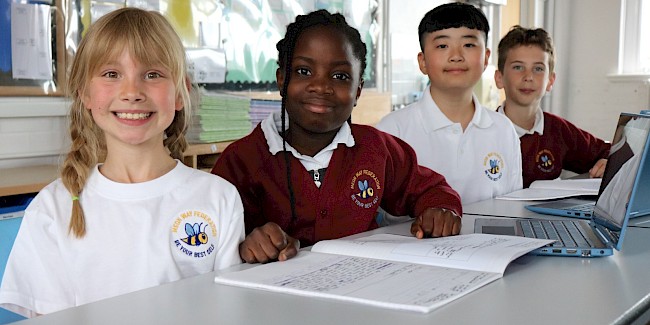Individual liberty
- Alongside rules and laws, we promote freedom of choice and the right to respectfully express views and beliefs. Our children are encouraged to know, understand and exercise their rights and personal freedoms and are taught how to exercise these safely, such as in our e-safety and SEAL lessons.
- Choices about learning challenges or activities.
- Choices about how they record their learning.
- Choices around the participation in extra-curricular activities (we have a large number of after school clubs).
- Assemblies – New Year’s Resolutions, Reading for Enjoyment (favourite books), E-Safety Assembly (Tracy Baldwin PCC E-Safety Officer), Independence assembly.
- E-safety lessons (all year groups), PSHE and Citizenship lessons (all year groups), sex and relationships (years 5 & 6), drug education (all year groups).
- Our ‘Healthy Living Week’, in which the children experienced a whole week of healthy activities and workshops (sport, healthy eating, road safety, etc) and how to make healthy choices.
We encourage the children to take ownership of not only their school but also of their own learning and progress. For example, a recent focus on independence and making your own choices in your learning.
Mutual Respect
Through our school’s values, PSHE curriculum and circle time pupils are taught to respect each other, to be cooperative and collaborative, to be supportive to one another and to look for similarities and but also value and respect differences between each other. Our school assemblies explore ideas, stories and celebrations from a range of cultures and backgrounds. All adults model respectful behaviour at all times.
Tolerance of those of Different Faiths and Beliefs
We teach the children to value and celebrate diversity rather than merely tolerate it. This is reflected in our RE, PSHE and Inclusion and Equality policies. An understanding of different faiths and beliefs is promoted through our Religious Education curriculum and children learn about different religions, their beliefs, places of worship and festivals. In addition in whole school assemblies significant religious and cultural festivals such as Ramadan, Eid, Diwali and Chinese New Year are celebrated and learnt about throughout the year. We are fortunate to have pupils from a variety of countries and religions. We are proud of how this makes our school such a rich and diverse community and aim to celebrate this whenever possible in school. For example, In Year 1 when traditional tales were being studies, pupils from Spain, China and Japan discussed and told some of their national traditional tales, which lead on to a more thorough understanding of what a traditional tale is.
An understanding of and respect for different cultures is also promoted through the celebration of European Day of languages, where pupils learn more about the language, food and heritage of different countries, and Arts Week, where pupils learn about traditional dances and art works from a variety of countries.
